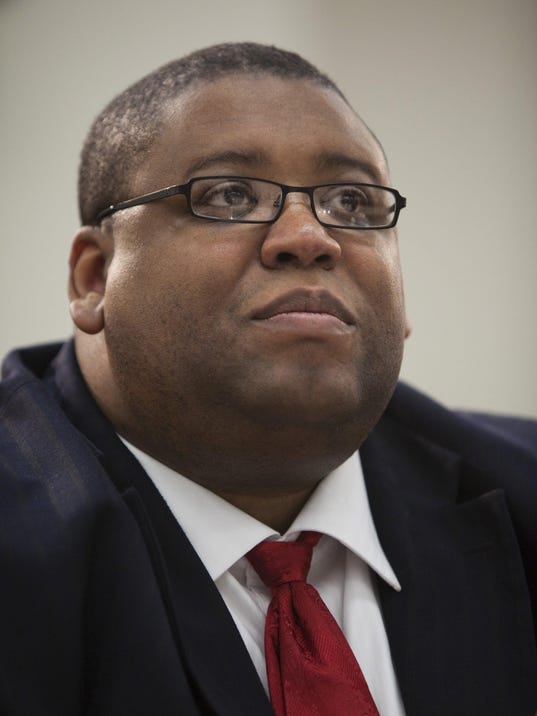NHTSA blocks former chief from Toyota testimony

Strickland(Photo: Evan Vucci / AP)
Washington — The National Highway Traffic Safety Administration blocked the agency’s former chief from testifying as a witness for Toyota Motor Corp. in a California civil suit, saying it could put the agency at risk.
In a July 1 letter obtained by The Detroit News, a NHTSA lawyer told former Administrator David Strickland that he could not testify in a class-action lawsuit against Toyota. The case involves Toyota’s Smart Key push-button ignition system, and whether it violates a federal regulation designed to prevent theft and roll-away risk.
“The agency has been roundly criticized for its relationship with Toyota in terms of recent enforcement actions, particularly regarding unintended acceleration,” NHTSA lawyer Timothy H. Goodman wrote in an eight-page letter to Strickland and a Toyota lawyer. “Given this history, Mr. Strickland’s testimony as a former NHTSA administrator describing Toyota’s actions or conduct in this matter with approval, will likely diminish the agency’s ability to pursue a vigorous enforcement review of Toyota moving forward.”
Transportation Department rules that generally prohibit the testimony of former employees in connection with matters that they were involved with while employed by the U.S. government. But Toyota argued that Strickland could testify about general matters, citing a 1994 memorandum.
Strickland defended his conduct. But both he and Toyota said they would not challenge the agency’s decision. “I relied on settled NHTSA precedent and interpretations in determining that my engagement was not only allowable, but well within the regulations regarding my testimony in a private matter,” Strickland told The News, adding “it is within the agency’s authority to change its interpretation ... and I respect its decision to do so.”
Toyota spokesman Scott Vazin said the automaker “respects and accepts NHTSA’s determination of this issue. Toyota’s retention of Mr. Strickland in this matter was based on our understanding of prior interpretations of the applicable regulation governing this type of interaction.”
Members of Congress during 2010 hearings said NHTSA hadn’t been tough enough in requiring Toyota to do more to address safety issues. An internal presentation to Toyota’s top North American executive from its Washington office bragged about saving more than $100 million by deterring the agency from seeking a more aggressive fix for unintended acceleration problems.
The agency’s letter is unusual in its strong language — and is the latest example of NHTSA taking a hard line with automakers in recent months.
Strickland left NHTSA in January 2014 after overseeing the agency for four years. He joined Washington law firm Venable LLP, a firm that has also represented Fiat Chrysler.
Many former NHTSA officials have represented or worked for automakers. Some members of Congress and safety advocates have criticized what they term a “revolving door” at NHTSA that allows officials to go to work in the auto industry. But former top officials can’t directly lobby the agency for two years after leaving.
Christine Spagnoli, a lawyer for the owners suing Toyota, praised NHTSA's decision as a "positive step."
"For too long there has been a revolving door at NHTSA which allowed former NHTSA employees to seek lucrative employment with the same auto manufacturers they had at one time been charged with regulating,” Spagnoli said. “Hopefully, the denial of Mr. Strickland's request to testify on behalf of Toyota is a sign that the new administrator recognizes that these historically cozy relationships between agency employees and the companies they are charged with regulating often results in undermining public trust."
NHTSA has taken a close look at keyless ignition systems. Last year, it asked a half-dozen automakers for information about their systems.
In December 2011, NHTSA proposed new rules standardizing keyless ignition controls — and to require audible warnings for drivers who fail to use the push-button system properly. NHTSA wants to mandate noise warnings for drivers who try to turn off their vehicle before putting it in park, exit a vehicle before moving the transmission to “park” or exit a vehicle without first turning it off.
NHTSA proposed standardizing the length of time necessary to push the controls to stop the engine, as part of an effort to help a panicked driver shut down the vehicle in an emergency.
The agency has not finalized the rules. It said it now expects to complete them by November, almost four years after it first proposed the change.
Lawyers for the owner of a 2012 Toyota Highlander argue the system allows owners to leave their vehicles running by accident after leaving their vehicles. The case set for an initial bench trial in Superior Court in Los Angeles on July 20 is limited to the question of whether the Toyota ignition system violates a federal safety standard. A second trial will look at whether the system is defective.
Vazin defended Toyota’s Smart Key system, saying it “goes above and beyond what is required by the relevant federal safety standards. This system not only provides added convenience, but also improved theft prevention and personal security benefits.”
http://www.detroitnews.com/story/business/autos/2015/07/07/nhtsa-blocks-former-chief-toyota-testimony/29844871/

